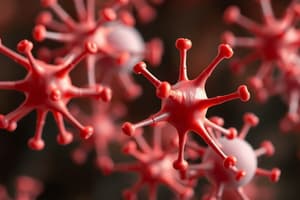Podcast
Questions and Answers
What is the main effect of cholinergic drugs?
What is the main effect of cholinergic drugs?
- Block the parasympathetic nervous system
- Cause increased heart rate
- Stimulate the parasympathetic nervous system (correct)
- Decrease muscle rigidity
What is a potential adverse effect of anticholinergic drugs?
What is a potential adverse effect of anticholinergic drugs?
- Decreased sweating (correct)
- Increased urinary output
- Stimulation of the sympathetic nervous system
- Constriction of the internal sphincter
When should patients taking anticholinergic drugs contact their doctor?
When should patients taking anticholinergic drugs contact their doctor?
- If they experience increased pooping
- If they have dilated pupils
- If they feel drowsy
- If they have muscle cramps (correct)
What is the antidote to anticholinergic drugs?
What is the antidote to anticholinergic drugs?
What effect do anticholinergic drugs have on heart rate?
What effect do anticholinergic drugs have on heart rate?
Which condition would be a contraindication for taking anticholinergic drugs?
Which condition would be a contraindication for taking anticholinergic drugs?
What is the potential consequence of giving anticholinergic drugs to patients with glaucoma?
What is the potential consequence of giving anticholinergic drugs to patients with glaucoma?
What is the role of atropine among anticholinergic drugs?
What is the role of atropine among anticholinergic drugs?
What is the main effect of anticholinergic drugs?
What is the main effect of anticholinergic drugs?
For which condition is the anticholinergic medication Dicyclomine/Bentyl commonly used?
For which condition is the anticholinergic medication Dicyclomine/Bentyl commonly used?
What is the antidote for atropine, an anticholinergic drug?
What is the antidote for atropine, an anticholinergic drug?
What is a potential adverse effect of anticholinergic drugs?
What is a potential adverse effect of anticholinergic drugs?
What is the primary effect of anticholinergic drugs?
What is the primary effect of anticholinergic drugs?
Which medication is commonly used for overactive bladder among anticholinergic drugs?
Which medication is commonly used for overactive bladder among anticholinergic drugs?
In what condition would anticholinergic drugs be given in the hospital before surgery?
In what condition would anticholinergic drugs be given in the hospital before surgery?
What is the primary role of Glycopyrrolate/Robinul, an anticholinergic drug?
What is the primary role of Glycopyrrolate/Robinul, an anticholinergic drug?
Which condition can be treated using Scopolamine, an anticholinergic medication?
Which condition can be treated using Scopolamine, an anticholinergic medication?
How do anticholinergic drugs affect the parasympathetic nervous system?
How do anticholinergic drugs affect the parasympathetic nervous system?
What is the potential risk for patients taking anticholinergic drugs?
What is the potential risk for patients taking anticholinergic drugs?
What is the effect of anticholinergic drugs on the internal sphincter?
What is the effect of anticholinergic drugs on the internal sphincter?
Which of the following conditions can be treated using anticholinergic medications?
Which of the following conditions can be treated using anticholinergic medications?
What is a potential use of anticholinergic drugs?
What is a potential use of anticholinergic drugs?
What is a potential condition for which anticholinergic drugs might not be suitable?
What is a potential condition for which anticholinergic drugs might not be suitable?
Anti-Cholinergic drugs dry you out.
Anti-Cholinergic drugs dry you out.
Before an operation, what anticholinergic drug would you see given to a patient?
Before an operation, what anticholinergic drug would you see given to a patient?
Flashcards are hidden until you start studying
Study Notes
Anticholinergic Drugs
- Main effect: Inhibit the action of acetylcholine, a neurotransmitter that stimulates muscle contractions and secretions.
- Adverse effect: Dry mouth, blurred vision, urinary retention, constipation, and tachycardia.
- Contact doctor: When experiencing adverse effects, such as difficulty urinating or allergic reactions.
- Antidote: Physostigmine, which reverses the effects of anticholinergic overdose.
- Effect on heart rate: Increases heart rate.
- Contraindication: Glaucoma, as anticholinergic drugs can increase intraocular pressure.
- Effect on glaucoma patients: Worsening of glaucoma symptoms.
- Role of Atropine: Blocks the action of acetylcholine, used to treat bradycardia, organophosphate poisoning, and as a pre-anesthetic medication.
- Main effect: Inhibit the parasympathetic nervous system, reducing secretions and muscle contractions.
Indications and Contraindications
- Dicyclomine/Bentyl: Used to treat irritable bowel syndrome (IBS).
- Anticholinergic medication for overactive bladder: Oxybutynin, Tolterodine, or Solifenacin.
- Scopolamine: Used to treat motion sickness, nausea, and vomiting.
- Pre-surgical use: Glycopyrrolate/Robinul, used to reduce secretions and prevent bronchospasms.
- Primary role of Glycopyrrolate/Robinul: Reduces secretions and prevents bronchospasms during surgery.
Effects on the Body
- Affects the parasympathetic nervous system: Reduces secretions and muscle contractions.
- Effect on the internal sphincter: Relaxes the internal sphincter, increasing the risk of urinary retention.
- Potential risk: Increased risk of heat stroke, especially in elderly patients.
- Dry mouth: Anticholinergic drugs can dry out the mucous membranes, causing dry mouth.
Conditions Treated
- Overactive bladder
- Irritable bowel syndrome (IBS)
- Motion sickness
- Nausea and vomiting
- Bradycardia
- Organophosphate poisoning
Studying That Suits You
Use AI to generate personalized quizzes and flashcards to suit your learning preferences.




